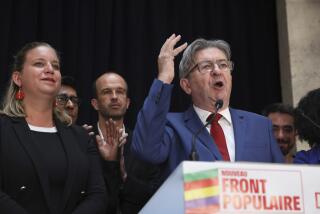Thatcher Gets a Thrashing in Europe Vote; Labor Elated : First Defeat in 10 Years for Tories
- Share via
LONDON — Prime Minister Margaret Thatcher’s Conservative Party was trounced today by socialists in elections for the European Parliament.
The Labor Party--inflicting Thatcher’s first defeat in a national ballot since she came to power 10 years ago--seized Tory districts across the country and won a solid majority of British seats in the European Economic Community’s assembly.
Labor leader Neil Kinnock burst into song in Welsh as he arrived at the party’s London headquarters. “Mrs. Thatcher must get the message from the British people--that she is yesterday’s prime minister leading yesterday’s government,” he said.
“We’ve not done well,” Thatcher’s energy secretary, Cecil Parkinson, acknowledged. “This is a warning to the government.”
“The results were disappointing, but we shall renew our efforts for next time,” Thatcher said in a letter to Conservative Party Chairman Peter Brooke.
With the economy in trouble, Labor’s big 10.4% swing against the government fueled charges that Thatcher’s free-market revolution isn’t working any more.
Edward Heath, the former Conservative prime minister who took Britain into the Europe Community in 1974, warned that the Tories could lose the next election in 1991 unless Thatcher changes her European policy.
“If you don’t show enthusiasm for the European Parliament and Europe as a whole, then you will get a Socialist majority here,” he told Tories.
“The prime minister has always underestimated the importance of the European Parliament. She treats it with contempt,” he said.
Many senior Conservatives attacked party advertisements as confused and negative, including one poster that warned electors that if they did not vote Conservative, they faced “a diet of Brussels”--referring to the EC headquarters and the vegetable Brussels sprouts, often served soggy and tasteless in English cuisine.
Labor won 45 of the 78 seats allocated to mainland Britain, compared to its previous total of 32. The Conservatives fell to 32 seats from 45. The Scottish National Party retained its one seat.
The Tory share of the vote slumped to 34.15%, compared to 42% at the 1987 general election, when Thatcher won a third five-year term, and to 40.8% in the last European elections in 1984.
Labor had 40.23%, up from 30.8% in the 1987 British election and up from 36.5% in the 1984 European elections.
Although only about one-third of eligible Britons voted, as is traditional in European elections, government leaders acknowledged that Kinnock had succeeded in turning the ballot into a referendum on Thatcher.
“We have got to get inflation under control. We have got to stick together. We have got to make sure the electorate understands the consequences of electing a Labor government,” said Parkinson.
For Labor, which has lost three general elections in a row, the major boost was pushing its vote above the 40% it needs to oust Thatcher at the next general election. This must be held by mid-1992.
“These are winning ways, and there is more to come,” Kinnock told reporters.
More to Read
Sign up for Essential California
The most important California stories and recommendations in your inbox every morning.
You may occasionally receive promotional content from the Los Angeles Times.










